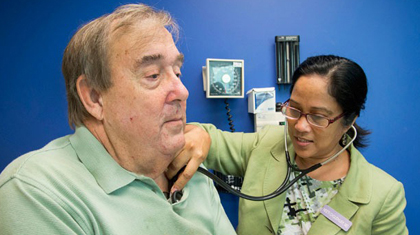
SEATTLE – New research from the University of Washington School of Medicine suggests that enabling patients to type pre-visit agendas into their medical records before a doctor’s appointment improves doctor-patient communication and creates efficiency in the visit.
The results were published this week in the Annals of Family Medicine.
Researchers examined the effects of having patients generate a portion of their own medical records. Lead author McHale Anderson, a third-year medical student at UW Medicine, said he was motivated by doctors who said they spend too little time with patients and too much time inputting medical data for each patient.
“I think patient participation and management of their own medical record is the next transition in medical practice throughout the country,” Anderson said. “Even though this is a small study, the findings are promising. The vast majority of the patients and doctors who participated reported quality improvements and wanted the practice to continue.”
Patients attending the Adult Medicine Clinic at Harborview Medical Center in Seattle were asked to type agendas into their records using computers in the waiting room. More than 80 percent of patients and doctors expressed that the agenda helped to prioritize the visit, and nearly 80 percent agreed that the doctors were more prepared for the visit and better understood the patient’s concerns, the findings stated.
One patient wrote, “Gave my doctor my information so I wouldn’t be nervous and forget.” Another wrote, “Doctor and I on the same page.” The doctors were similarly enthusiastic, providing comments such as, “Got time to think about issues ahead of time” and, “Engaged patient to participate more in the visit, he felt heard.”
More than 60 percent of doctors and nearly 80 percent of patients felt the visit was more efficient.
“These findings extend the existing OpenNotes research about patient engagement and the medical record,” said Dr. Joann Elmore, UW professor of medicine. She is research director for OpenNotes, a national movement that encourages doctors, nurses and other healthcare professionals to share the notes they write with the patients they care for. The goal is to improve communication and safety and quality of care by giving patients online access to information they are already entitled to.
In addition to Anderson and Elmore, investigators include: Dr. Sara Jackson, Natalia Oster, Sue Peacock, and Galen Chen from UW Medicine; and Jan Walker from Beth Israel Deaconess Medical Center and Harvard Medical School.
Support for this research was provided by The Commonwealth Fund, Robert Wood Johnson Foundation, Gordon and Betty Moore Foundation, Peterson Center on Healthcare, Cambia Health Foundation, the National Cancer Institute (K05 CA104699), and the University of Washington School of Medicine Medical Student Research Training Program.



